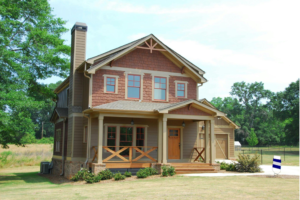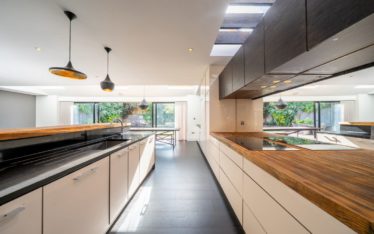The journey to homeownership is filled with crucial decisions, among which the type of house to purchase stands as one of the most significant.
This choice affects not just the immediate comfort and lifestyle of the buyers but also has long-term implications on maintenance responsibilities, financial obligations, and potential for property appreciation.
Recognizing the weight of this decision, this article aims to delve into the pros and cons of various house types, providing a comprehensive overview to help potential buyers make informed decisions that align with their lifestyle, budget, and future aspirations.
Single-Family Homes
Pros
- Privacy: Single-family homes offer unparalleled privacy, with no shared walls, floors, or ceilings with neighbors.
- Ownership of Land: Buyers own the land on which the house sits, offering outdoor space for personal use and the potential for future expansions.
- Customization and Expansions: These homes typically offer more freedom for renovations and customizations, allowing owners to tailor their space to their preferences.

Cons
- Higher Maintenance Costs: Owners are solely responsible for all maintenance, from lawn care to structural repairs, which can be costly and time-consuming.
- Responsibility for All Repairs: Unlike in shared housing arrangements, the homeowner is responsible for all repairs, which can be unpredictable and expensive.
- Generally Higher Purchase Price: Single-family homes often come with a higher purchase price compared to other housing types, making them less accessible for some buyers.
Condominiums
Pros
- Lower Maintenance Responsibilities: Condo owners enjoy reduced maintenance duties, as the homeowners’ association (HOA) typically takes care of exterior maintenance and common areas.
- Access to Community Amenities: Many condominium complexes offer amenities such as pools, fitness centers, and security services, enhancing the living experience.
- Desirable Urban Areas: Condos are often located in urban or densely populated areas, providing convenient access to shopping, dining, and entertainment options.

Cons
- Homeowners Association (HOA) Fees: The amenities and maintenance services come at a cost, often in the form of monthly HOA fees, which can be significant.
- Less Privacy: Sharing walls with neighbors means less privacy compared to detached homes.
- Restrictions on Customization: Condominium living comes with restrictions on how much owners can alter their living spaces, from interior design choices to renovations.
Common Condo Styles
Condominium living offers a diverse array of styles, each catering to different preferences and lifestyles. Below, we explore some common condo styles, highlighting their unique features and appeal to help potential buyers identify what might best suit their urban living aspirations.
- High-Rise Condos: These are typically found in urban centers, offering spectacular city views and are often part of buildings with extensive amenities.
- Townhouse-Style Condos: These combine features of single-family homes and condos, offering multiple floors within a single unit and sometimes a small yard, usually with lower HOA fees than high-rise condos.
- Loft Condos: Located often in renovated industrial buildings, loft condos feature open floor plans, high ceilings, and industrial design elements, appealing to those who seek a modern, urban living space.
Townhouses
Pros
- More Affordable: Generally, townhouses are more affordable than single-family homes, offering a cost-effective entry into homeownership.
- Some Outdoor Space: Unlike apartments, townhouses often come with a small yard or patio, providing private outdoor space for leisure or gardening.
- Less Maintenance: While owners are responsible for the interior, external maintenance and landscaping are usually managed by the homeowners’ association (HOA), reducing the maintenance burden.

Cons
- Shared Walls with Neighbors: Similar to apartments, townhouses share walls with neighbors, which can limit privacy and increase noise.
- HOA Rules and Fees: Living in a townhouse community often comes with HOA rules that can dictate everything from paint colors to parking, along with monthly or annual fees.
- Limited Outdoor Space: While some outdoor space is a plus, it’s often limited compared to what’s available with single-family homes, which might not meet the needs of all homeowners.
Apartments
Pros
- No Maintenance Responsibilities: One of the biggest advantages of apartment living is the lack of maintenance responsibilities, as landlords or property management companies handle repairs and upkeep.
- Flexibility to Move: Leasing an apartment offers significant flexibility, making it easier to move for job opportunities or personal reasons.
- Utilities and Amenities Included: Many apartment complexes include utilities in the rent and offer amenities such as gyms, pools, and communal spaces, enhancing the living experience without additional costs.

Cons
- No Ownership: Renting an apartment does not contribute to building equity or ownership, which can be a significant drawback for those looking to invest in their future.
- Restrictions on Pets and Customization: Apartments often come with restrictions on pet ownership and limit the ability to customize or renovate the space, which can be frustrating for some residents.
- Potential for Noise from Neighbors: Close quarters with neighbors above, below, and beside can lead to increased noise, impacting comfort and privacy.
Co-operative Housing (Co-ops)
Pros
- Lower Purchase Price: Co-ops often have a lower entry price compared to condos, making them an attractive option for buyers in expensive urban markets.
- Community Decision-Making: Co-op residents have a say in the governance of the building, allowing for a communal approach to decisions and maintenance.
- Often in Urban Areas: Like condos, co-ops are frequently located in urban centers, providing easy access to city amenities and public transportation.
Cons
- Rigorous Approval Process: Potential residents must be approved by the co-op board, which can be a daunting and invasive process.
- Difficulty Selling Shares: Co-op shares can be more challenging to sell than a condo unit, as the buyer must also be approved by the co-op board.
- Less Autonomy: Co-op living means adhering to the rules and decisions of the co-op board, which can limit personal autonomy compared to owning a condo or single-family home.
Each of these housing options comes with its unique set of advantages and limitations. Understanding these can help potential buyers and renters align their housing choice with their lifestyle preferences, financial capabilities, and long-term goals, ensuring a satisfying and rewarding living experience.
Takeaway
Choosing the right type of home is a critical decision that influences not only your daily comfort but also your financial future.
As potential homeowners weigh these options, it’s essential to consider their lifestyle preferences, financial capabilities, and long-term goals.
Understanding the pros and cons of each housing type can lead to a more informed decision, ensuring that the chosen home aligns with one’s aspirations and provides a fulfilling living environment.
Ultimately, the key to successful homeownership lies in balancing personal desires with practical realities, making a choice that supports a happy and secure future.






